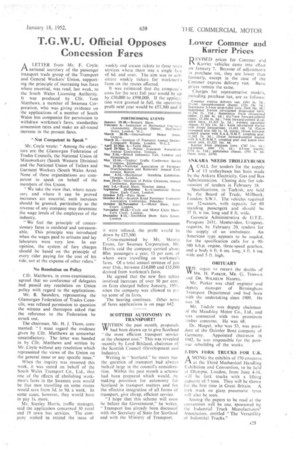T.G.W.U.• Official Opposes Concession 'Fares
Page 27

If you've noticed an error in this article please click here to report it so we can fix it.
ALETTER from Mr. F. Coyle, national Secretary of the passenger transport trade group of the Transport and General Worker's' Union, supporting the prinCiple of increasing bus fares where essential, Was read, last week, to the South Wales Licensing Authority. It was produced by alr. Tom Matthews, a Member of Swansea Corporation, who was giving evidence on the applications of a number of South Wales bus companies for permission to withdraw workmen's fares, standardize concession rates and make an all-round increase in the present fares.
" Not Competent to Speak" Mr. Coyle wrote: "Among the objettors are the Glamorgan Federation of Trades Councils, the National Union Of Mineworkers (South Western Division) and the National Union of Tailors and Garment Workers (South Wales Area). None of these organizations are competent to speak on behalf of the members of this Union, " V/e take the view that, where necessary and where it can be proved increases arc essential, such increases should be granted, particularly as the revenue of any company may determine the wage levels of the,employees of the industry.
-" We feel the principle of concessionary fares is outdated and unreason, able, This principle was introduced when the wages paid to artisans and lay labourers were very low. In our opinion, the system of fare charges should be based on the principle of every rider paying for the cost of his ride, not at the expense of other riders."
No Resoludon on Policy Clir. Matthews, in cross-examination, agreed that no conference of delegates had passed any resolution on Union policy With regard to the applications.
Mr. F.. Saunders, representing the Glamorgan Federation of Trades Councils, was refused permission to question the witness and thereupon asked that the reference to the Federation be struck out.
The chairman, Mr. H. J. Thom, commented: " I must regard the evidence given by Cllr. Matthews as somewhat unsatisfactory. The letter was handed in by Cllr. Matthews and written by Mr. Coyle without any resolution which represented the views of the Union on the general issuer orany specific issue."
When the inquiry was resumed this week, it was stated on behalf of the South Wales Transport Co., Ltd., that one of the effects of abolishing workmen's fares in the Swansea area would be that men travelling on some routes would save from 3d, to 9d. a week. In some eases, however, they would have to pay is. more.
Mr. Stanley Harris. traffic manager, said the application concerned 30 rural and 19 town bus services. The company wished to extend the issue of
weekly and season tickets to those town services where there was a single fare of 6d. and over. The aim was to substitute weekly tickets for workmea's fares on the routes affected.
It was estimated that the company's costs for the next full year would be up by £50,000 to £998,000. If the application were granted in full, the operating profit next year would be £57,300 and if it were refused, the profit would be down by £27,300.
Cross-examined by Mr. Meurig Evans, for Swansea Corporation, Mr. Harris said the company carried about 80m. passengers a year, 13 per cent. of whom were travelling on workmen's fares. Of a total annual revenue of just over ilm., between £14,000 and £15,000 derived from workmen's fares.
He agreed that the new fare tables involved increases of over 50 per cent. on fares charged before January, 1951, when the company was allowed to put up some of its fares.
The hearing continues. Other news of fares applications is on page 642.
SCOTTISH AUTONOMY IN TRANSPORT? WITHIN the past month, proposals VY had been drawn up to give Scotland " the most efficient transport service at the cheapest cost." This was revealed recently by Lord Bilsland, chairman of the Scottish Council (Development and Industry).
Writing in "Scotland," he states thai the question of transport had always bulked large in the council's consideration. Within the past month a scheme had been prepared which would, by making provision for autonomy for Scotland in transport matters and for the effective integration of all forms of transport, give cheap, efficient service.
" I hope that this scheme will soon be before the Government," he writes. " Transport has already been discussed with the Secretary of State for Scotland and with the Ministry of Transport.




















































































